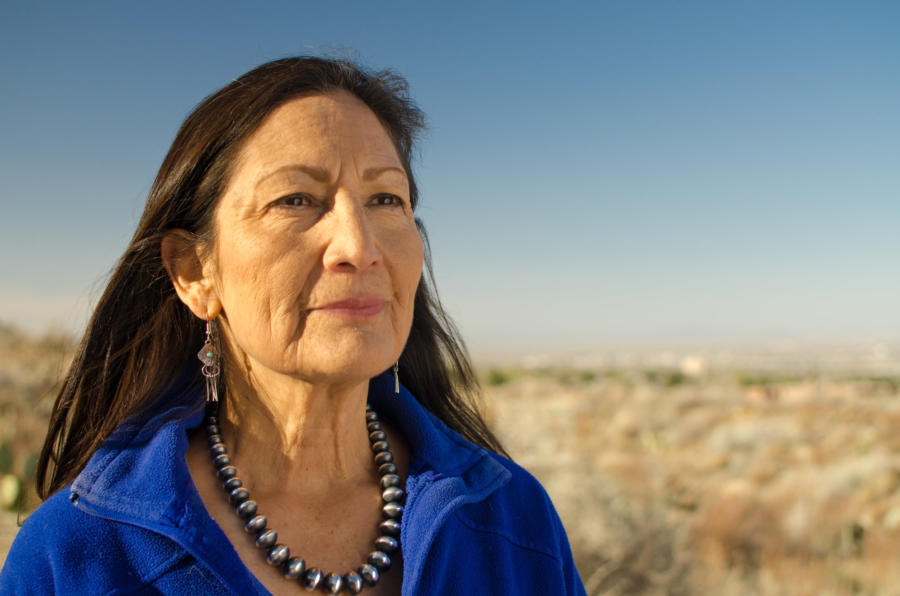
- Details
- By Deb Haaland
As we head into the final days of yet another unforgettable year, it’s important to take lessons from where we’ve been and consider the road ahead. For Indigenous peoples, this year has brought so much promise – and there is no turning back.
There’s no denying it’s been a year of considerable challenges. Historic drought and wildfires, a global pandemic, and a worsening climate crisis that requires an urgency that sometimes feels like it is falling flat among elected officials. Yet as our people have done since time immemorial, we persevere.
I say it often – but I truly believe we are in a new era for Indigenous people.
Leadership matters, and President Biden is committed to strengthening the federal government’s nation-to-nation relationships with Native American and Alaska Native communities. Under his leadership, our Administration immediately began working with Tribes to deliver COVID-19 economic relief through the American Rescue Plan and distributing vaccinations to keep Indigenous families, elders, and communities safe. This helped fill the gaps in access to life-saving resources that have disproportionately beset Indigenous communities.
We stepped forward to address the legacy and intergenerational trauma that is hurting our people. I launched the Interior Department’s Missing and Murdered Unit to put the full weight of the federal government into investigating these cases and marshalling law enforcement resources across federal agencies and throughout Indian Country.
When everyone’s eyes were turned toward the tragic discoveries of unmarked graves of children from Indian Boarding Schools, we launched the Federal Indian Boarding School Initiative to shed light on the truth of what happened in these places and carve a path to healing. Since then, the Interior Department has consulted with Tribes and are working together to manage the upswell of information at the Bureau of Indian Affairs.
This work often takes a toll on our hearts and forces us to relive the trauma we carry. To help with this, the Department is working with the Indian Health Service to develop culturally appropriate support resources for Indigenous communities.
Yet as we continue healing from the most traumatic parts of our history, we cannot forget the joy we feel knowing that our ancestral homelands and traditions will be protected for generations to come.
I stood on the White House Lawn alongside President Biden this summer when he fully restored boundaries for the Bears Ears National Monument. I felt the weight of that moment and remembered the many times I felt the presence of our ancestors in those canyons. It was the same feeling I felt under the blue sky and among the stones that the ancestors carefully placed with their own hands as Tribal leaders celebrated our proposed protections for Chaco Canyon.
This was one of many announcements made during the White House Tribal Nations Summit – the first one held in four long years and the embodiment of our Administration’s commitment to working with Tribes. We also launched efforts to revitalize Native languages, uphold treaty rights, and strengthen Tribal co-management. The discussions and feedback we received during the summit will help ensure that the policies we create reflect the needs of Indigenous communities in the coming years.
As we look to the future, we are facilitating the distribution of billions of dollars to Indigenous communities thanks to the Bipartisan Infrastructure Law, the largest investment in the resilience of our physical and natural systems. These transformational investments will build on the accomplishments we made in 2021 and set us up for even more progress in 2022.
I stand here on the shoulders of the ancestors who carved a clear path ahead of me. All of Indian Country has my commitment to ensure that future generations have every opportunity to achieve their dreams and one day stand on my shoulders to achieve more than we can even dream of.
Deb Haaland is the Secretary of the Interior and made history as the first Native American cabinet secretary.
More Stories Like This
Disrupting Poverty Through OpportunitySanctuary Cities Under Siege: When Federal Power Becomes a Weapon Against the People
Denmark's Genocidal Practices in Greenland
Cherokee Nation Stands Against Predatory Lending
Tribes Seek Better Data, Real Accountability in MMIP Cases Ahead of Tribal Consultation
Help us defend tribal sovereignty.
At Native News Online, our mission is rooted in telling the stories that strengthen sovereignty and uplift Indigenous voices — not just at year’s end, but every single day.
Because of your generosity last year, we were able to keep our reporters on the ground in tribal communities, at national gatherings and in the halls of Congress — covering the issues that matter most to Indian Country: sovereignty, culture, education, health and economic opportunity.
That support sustained us through a tough year in 2025. Now, as we look to the year ahead, we need your help right now to ensure warrior journalism remains strong — reporting that defends tribal sovereignty, amplifies Native truth, and holds power accountable.
 The stakes couldn't be higher. Your support keeps Native voices heard, Native stories told and Native sovereignty defended.
The stakes couldn't be higher. Your support keeps Native voices heard, Native stories told and Native sovereignty defended.
Stand with Warrior Journalism today.
Levi Rickert (Potawatomi), Editor & Publisher
